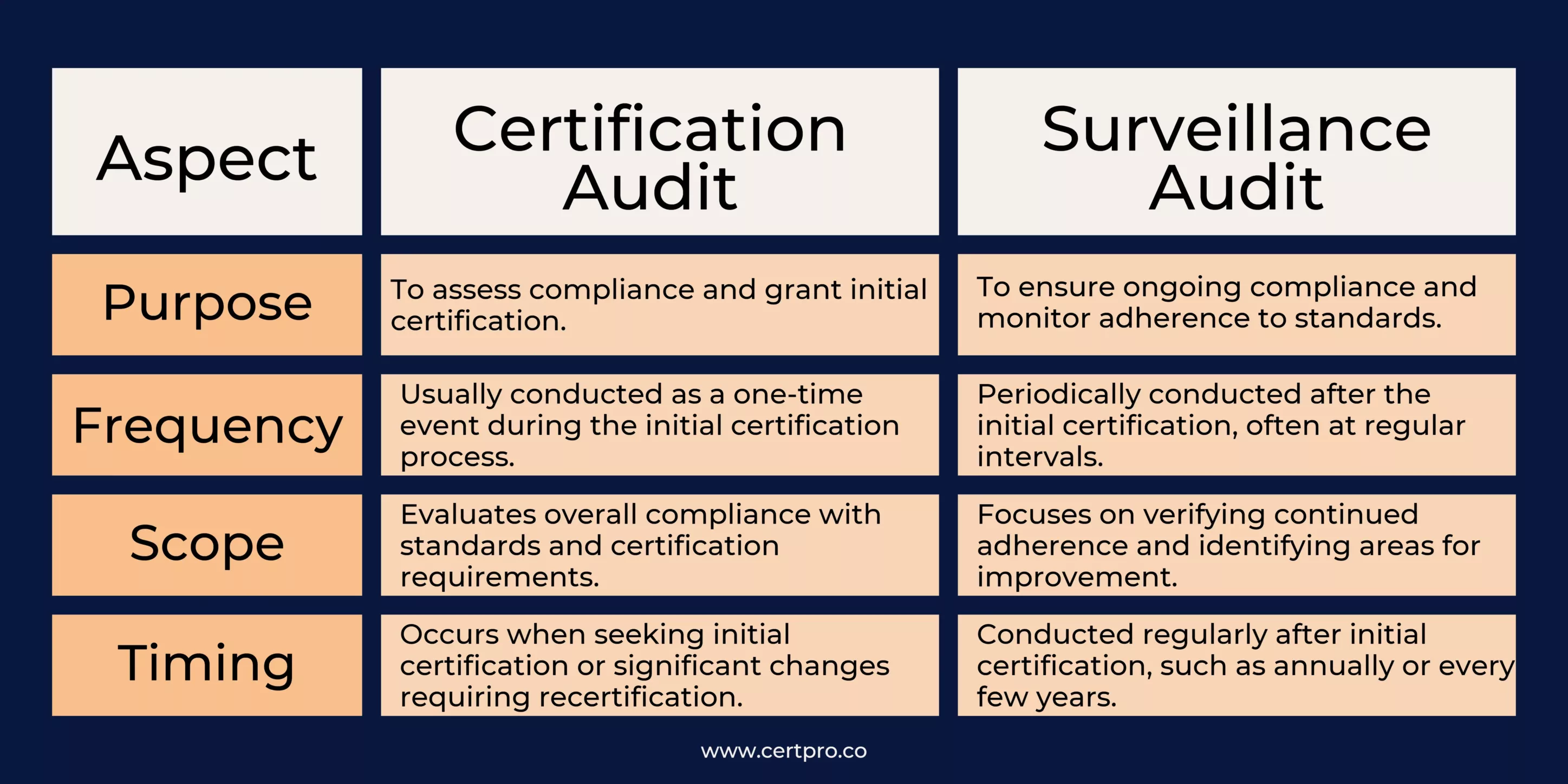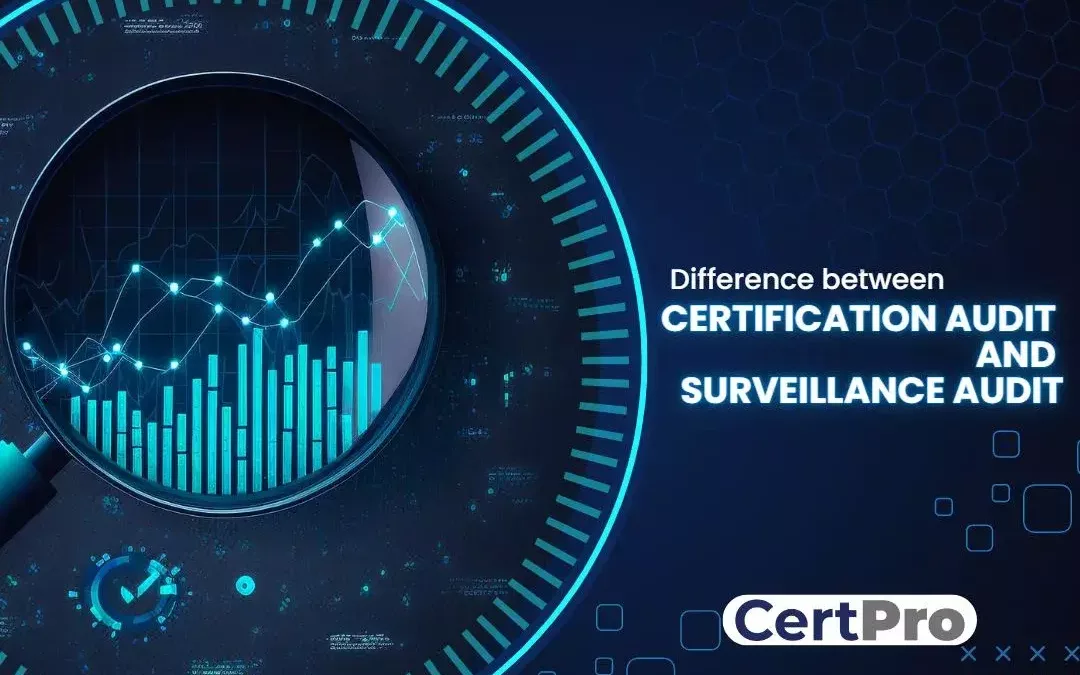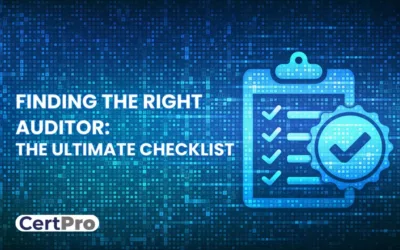In these times, organizations are striving to demonstrate their commitment to excellence by continuously improving and sticking to industry standards in Quality Management Systems (QMS). To achieve this, many organizations are undergoing audits to assess their conformity with these industry standards. There are two crucial types of audits: Certification Audits and Surveillance Audits. Despite sounding similar to each other, these terms have distinct characteristics, timelines, and objectives, and each of them serves a unique purpose in evaluations. Organizations that are seeking compliance and enhanced performance should understand the key differences between both of these audits.
The purpose of this article is to shed light on the key differences between these two audits, including their purpose, frequency, scope, and importance. In order to ensure optimal compliance and continual growth, organizations must unwind these contrasts in order to better navigate the audit landscape.
WHAT IS A CERTIFICATION AUDIT?
A Certification Audit is an out-and-out evaluation that is conducted by a third party certification body to assess a company’s compliance with specific standards and the standard’s regulations. During a certification audit, the purpose is to determine whether the company’s management system, processes, and practices meet the particular industry standards or certification scheme.
The Auditor examines various aspects of the organization during the certification audit, like policies, procedures, documentation, and the previous records of the company. It helps to know whether the organization is complying with the prescribed standards. The audit process also involves a thorough examination of the organization’s operations, employee interviews, on-site inspections, and document reviews.
In the process of certification auditing, verifying the organization’s conformance to the specific standard and identifying areas for improvement is the main procedure. If the firm satisfies the following necessities and requirements of the particular standard, then issuing a certification or compliance statement is one of the main goals of this auditing process. In order to assure continuous compliance and the renewal of the certification, certification audits are often performed just once, frequently during the original certification process.
WHAT IS A SURVEILLANCE AUDIT?
A Surveillance Audit is a periodic process that is conducted by a certification body to check whether an organization is still abiding by the rules and regulations of a particular standard. This audit is an ongoing process after a company is certified to a standard. This audit is different from the certification audit, which takes place during the original certification process.
The initial purpose of the surveillance audit is to confirm that the company is still adhering to the rules and upholding the standards and procedure list as per certification requirements. It strives to evaluate the management system, procedures, and controls of the organization’s sustainability and effectiveness over time. It also examines the organization’s continuing compliance with the established standards by reviewing pertinent paperwork, conducting employee interviews, and conducting on-site inspections. Additionally, they could assess the organization’s actions in resolving the unconformities and the chances of improvement in the company.
There exists an often overlooked audit that holds significant importance and deserves attention. It is a Recertification audit. It happens once every three years. A certification authority conducts an evaluation, also referred to as a revalidation audit or renewal audit, to confirm that an organization is adhering to the requirements of a particular standard or certification scheme. It happens while the organization’s current certification’s validity period is about to expire.
THE KEY DIFFERENCE BETWEEN A CERTIFICATION AUDIT AND A SURVEILLANCE AUDIT
BENEFITS OF A CERTIFICATION AUDIT
Certification audits offer numerous benefits to organizations, such as enhancing their credibility, market recognition, and compliance assurance. After obtaining certification successfully by going through such a rigorous audit process, organizations showcase their commitment to the recognized standards and their best practices. This validation helps the company build its value and trust in the market and boosts its confidence among customers. Additionally, certification gives businesses a competitive edge by differentiating them from uncertified rivals, enhancing their appeal to potential clients, and opening up new market prospects.
Moreover, certification audits help companies improve their overall performance and mitigate risk. It helps organizations improve operational effectiveness, save costs, and provide consumers with better goods or services by putting in place established procedures and quality management systems.
BENEFITS OF A SURVEILLANCE AUDIT
A surveillance audit ensures lots of benefits for an organization, which include ongoing compliance, continual improvement, and building trust in your company.
Firstly, by conducting regular assessments, organizations can demonstrate their commitment to upholding the prescribed standards and best practices. This also helps reduce the risk of non-compliance, penalties, and reputational damage.
Secondly, surveillance audits help with continual improvement. By periodically evaluating the performance and checking out the risks in the company. It helps in finding areas for refinement and enhancement. The feedback and ideas provided during the surveillance audit help organizations streamline their operations and overall performance. It helps build a culture of ongoing learning, innovation, and operational excellence.
Last but not least, surveillance audits act as a warning for possible issues and risks. These audits assist in identifying emerging risks and areas for improvement by frequently assessing an organization’s methods and controls. As a result, firms are better equipped to take prompt corrective action, improve their risk management procedures, and proactively handle any potential problems before they get out of hand.

FAQ
How frequently should surveillance audits be performed?
An auditor from the certifying organization visits the business on a regular basis to check on the effectiveness of the management system. The auditor must carry out a surveillance audit at least once per year.
What does a certification audit cover?
As they evaluate the organization’s entire compliance with the established standards or certification requirements, certification audits have a wider reach. They assess the management system, procedures, supporting documentation, and application of the required practices in all pertinent areas.
What is the focus of a surveillance audit?
Comparatively speaking, surveillance audits are more focused than certification audits. They mainly seek to confirm that the business is still adhering to the established standards and to spot any modifications or areas that could need improvement after the first certification.
How many different kinds of audit certifications exist?
Based on the evaluation of the company’s financial accounts, the auditor may offer one of four different types of audit report opinions. They are Unqualified audit report, Qualified, Adverse, and Disclaimer.
How many types of security audits are there?
Internal auditing is used to evaluate and improve the effectiveness of an organization’s governance, risk management, and internal control processes, and an external audit is intended to provide an independent and unbiased opinion on the fairness and accuracy of an organization’s financial statements.

About the Author
ANUPAM SAHA
Anupam Saha, an accomplished Audit Team Leader, possesses expertise in implementing and managing standards across diverse domains. Serving as an ISO 27001 Lead Auditor, Anupam spearheads the establishment and optimization of robust information security frameworks.
FINDING THE RIGHT AUDITOR: THE ULTIMATE CHECKLIST
Selecting an auditor to implement industry-specific rules and regulations is vital. The choice can influence the company’s growth and financial health. Therefore, choosing the right auditor offers valuable insights and ensures compliance and economic stability. You...
AI Audit Guidelines and Best Practices: Applying AI Towards Its Full Potential
Artificial Intelligence is entering different industries, where it is used for customer handling, data management, and documentation processes. The interference of AI is increasing concerns regarding ethical practice and safety. Therefore, AI audits have become more...
AUDIT LOG: INFORMATION SECURITY BEST PRACTICES FOR BUSINESSES
An audit log is the best information security practice for organizations. This article elaborates on the operational process of audit logs and how companies utilize them for business growth. What is an audit log, and how does it work for organizations? For more...




